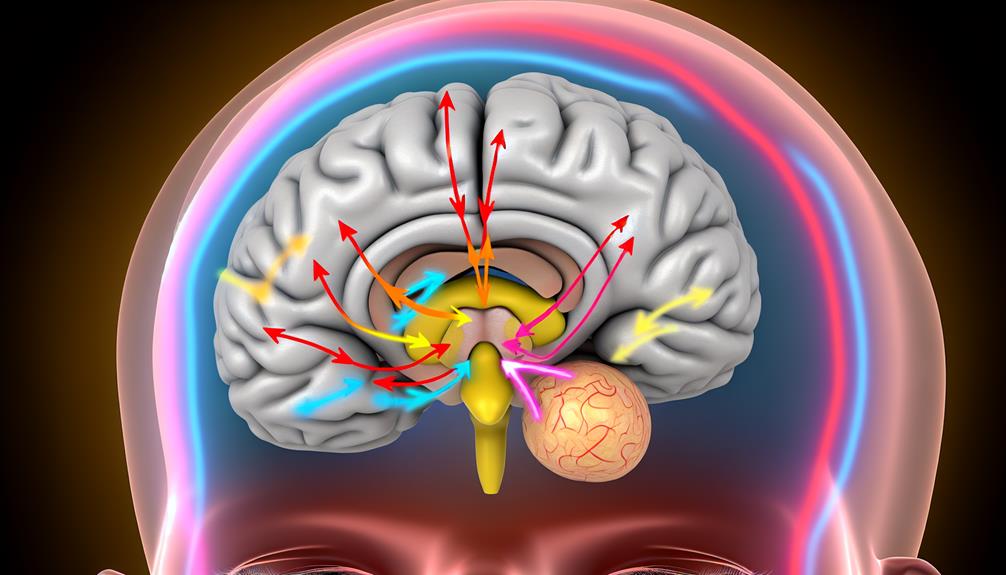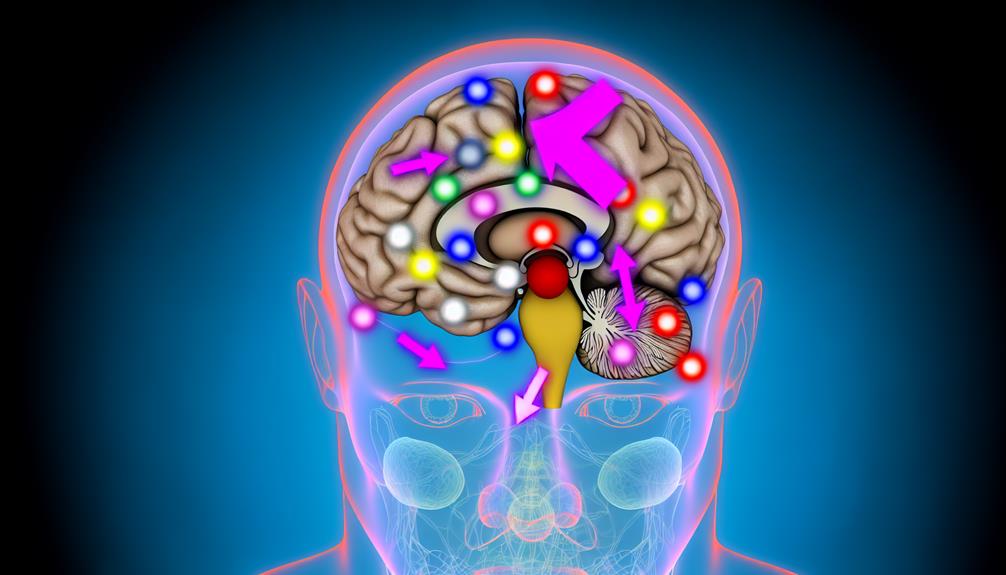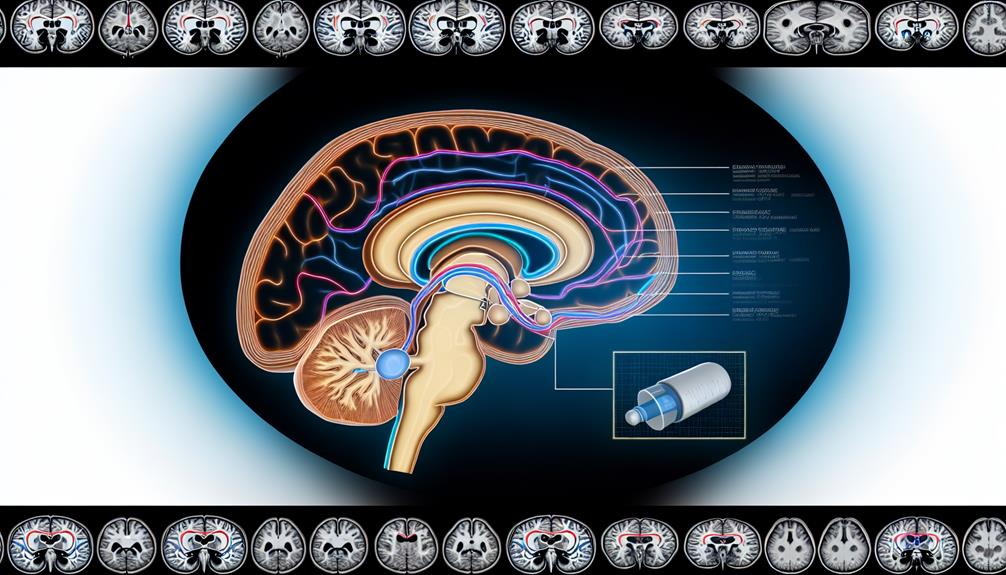The pituitary gland plays an essential role in male hormone balance by regulating the secretion of luteinizing hormone (LH) and follicle-stimulating hormone (FSH). LH stimulates testosterone production in the testes, while FSH is critical for sperm development. This regulation operates through a feedback loop: low testosterone levels signal the pituitary to release more LH and FSH, while adequate levels have the opposite effect. Disruptions in this system can lead to significant hormonal imbalances, which might manifest as various health issues. Understanding these mechanisms provides insights into testosterone regulation and its impact on male health. There's more to uncover about this intricate process.
Overview of the Pituitary Gland

The intricate nature of the pituitary gland plays a significant role in our endocrine system, acting as the master regulator of hormone secretion. Nestled at the base of the brain, the pituitary gland's anatomy consists of two primary lobes: the anterior and posterior lobes. Each lobe has distinct glandular functions that are essential for maintaining homeostasis within the body.
The anterior lobe, or adenohypophysis, is responsible for producing and releasing a variety of hormones that influence several physiological processes. These include growth, metabolism, and reproductive functions. It's fascinating how this small gland can orchestrate such complex bodily functions through its hormone secretion. The posterior lobe, or neurohypophysis, primarily stores and releases hormones synthesized in the hypothalamus, such as oxytocin and vasopressin, which are critical for water balance and social bonding.
What strikes me is the interconnectedness of the pituitary gland with other endocrine organs. The pituitary communicates with the hypothalamus, receiving signals that dictate its hormone release. This feedback loop guarantees that hormone levels remain balanced, adapting to the body's needs. Understanding the nuances of pituitary anatomy and its glandular functions is fundamental for grasping how this small but significant gland affects overall health, particularly in the context of male hormone balance. It's a reminder of how intricately linked our bodily systems are, with the pituitary gland at the center of this regulatory network.
Hormones Produced by the Pituitary
Within the complex landscape of the endocrine system, hormones produced by the pituitary gland serve as critical messengers that regulate various bodily functions. I find it fascinating how these pituitary hormones, such as luteinizing hormone (LH) and follicle-stimulating hormone (FSH), play a pivotal role in male hormone balance. LH stimulates the Leydig cells in the testes to produce testosterone, while FSH is essential for spermatogenesis and also influences the Sertoli cells, which support sperm development.
The interplay of these hormones intricately affects not just reproductive health, but also broader physiological processes. For instance, the secretion of LH and FSH is regulated by gonadotropin-releasing hormone (GnRH) from the hypothalamus. This highlights the hormonal interplay that exists between different components of the endocrine system. I can't stress enough how crucial it is to understand that an imbalance in these pituitary hormones can lead to significant repercussions on overall male health.
Moreover, the pituitary gland also releases growth hormone (GH) and prolactin, which, while not directly linked to testosterone production, can influence metabolic processes and reproductive health. The regulatory mechanisms governing these hormones are complex and interconnected, emphasizing the importance of the pituitary in maintaining hormonal equilibrium. To sum up, the pituitary gland's hormones are not merely messengers; they are integral players in the endocrine orchestra that sustains male hormone balance, highlighting the importance of their precise regulation.
Impact on Testosterone Production

In exploring the impact on testosterone production, I find it essential to understand the hormonal regulation mechanisms governed by the pituitary gland. The feedback loop between the pituitary and the testes plays a vital role in maintaining testosterone levels, especially as age-related changes come into play. By examining these interactions, we can gain insights into the complexities of male hormone balance.
Hormonal Regulation Mechanisms
Hormones play an essential role in regulating testosterone production, and understanding these mechanisms can shed light on male health. The pituitary gland is pivotal in this process, acting as a master regulator through endocrine signaling. It secretes luteinizing hormone (LH) and follicle-stimulating hormone (FSH), which directly influence the testes to produce testosterone.
The relationship between these hormones is a significant aspect of hormonal homeostasis. When testosterone levels drop, the pituitary gland senses this change and increases LH and FSH release. This response stimulates Leydig cells in the testes, prompting them to produce more testosterone. Conversely, when testosterone levels are adequate, the pituitary gland reduces LH and FSH secretion, maintaining a delicate balance.
Moreover, the hypothalamus plays an important role by releasing gonadotropin-releasing hormone (GnRH), which further regulates the pituitary's secretion of LH and FSH. This intricate network guarantees that testosterone levels remain within a healthy range, highlighting the importance of hormonal regulation mechanisms. By understanding these pathways, we can better appreciate how disruptions in this system could lead to hormonal imbalances and associated health issues.
Feedback Loop Importance
Understanding the feedback loop's role in testosterone production is fundamental for grasping male hormonal health. The pituitary gland, alongside the hypothalamus and testes, operates within intricate feedback mechanisms to maintain hormonal homeostasis. This balance is significant, as disruptions can lead to various health issues.
Here's a brief overview of the feedback loop's importance:
- Hypothalamic Release: The hypothalamus secretes gonadotropin-releasing hormone (GnRH), stimulating the pituitary gland to produce luteinizing hormone (LH) and follicle-stimulating hormone (FSH).
- Testosterone Production: LH prompts the Leydig cells in the testes to produce testosterone, which is essential for male reproductive functions and overall health.
- Negative Feedback: Elevated testosterone levels signal the hypothalamus and pituitary to reduce GnRH and LH secretion, ensuring that testosterone levels remain within a healthy range.
This dynamic feedback loop is foundational. It illustrates how the body self-regulates to maintain hormonal homeostasis, preventing both excess and deficiency. Understanding these mechanisms is key to appreciating how testosterone production is finely tuned, affecting various physiological processes in men.
Age-Related Changes
As men age, notable changes occur in testosterone production, often leading to significant health implications. I've observed that testosterone levels typically peak in early adulthood and gradually decline thereafter, influenced by various factors. Lifestyle factors play an essential role; poor nutrition can impact hormone levels, while a balanced diet rich in necessary nutrients may support testosterone production.
I've also noted the effects of exercise on hormone balance. Regular physical activity can boost testosterone, whereas a sedentary lifestyle may exacerbate declines. Additionally, stress management is important; chronic stress elevates cortisol levels, which inversely affects testosterone.
Genetic influences can't be overlooked; some men may have a predisposition to lower testosterone levels due to hereditary factors. Environmental triggers, such as exposure to endocrine disruptors, can further complicate hormone balance.
Symptoms of Pituitary Dysfunction
The pituitary gland, often referred to as the "master gland," plays an essential role in regulating various hormones that affect numerous bodily functions. When it malfunctions, the symptoms of pituitary dysfunction can be quite pronounced, and they often stem from various causes of dysfunction, including tumors, trauma, or certain lifestyle factors like stress and poor nutrition.
If you're experiencing symptoms, you might notice:
- Changes in Libido: A significant decrease in sexual desire or performance can signal hormonal imbalances due to pituitary issues.
- Unexplained Weight Changes: Sudden weight gain or loss may reflect alterations in metabolism controlled by pituitary hormones.
- Fatigue and Weakness: Persistent tiredness or muscle weakness could be linked to inadequate hormone production, affecting energy levels.
These symptoms can be subtle at first but may escalate as the dysfunction progresses. I can't stress enough that lifestyle factors, such as poor diet, lack of exercise, and chronic stress, can exacerbate these issues, complicating the hormonal landscape further.
It's essential to pay attention to your body and recognize these signs. The interplay of hormones is delicate, and a malfunctioning pituitary can disrupt this balance, illustrating the significance of maintaining overall health. If you're experiencing these symptoms, it's important to consult a healthcare professional to explore the underlying causes and seek appropriate interventions.
Diagnosing Pituitary Disorders

When evaluating potential pituitary disorders, a detailed diagnostic process is essential. First, I gather an extensive patient history, focusing on any symptoms that could indicate hormonal imbalances. This initial clinical evaluation sets the stage for further investigation. I assess symptoms such as fatigue, changes in libido, and weight fluctuations, as these can provide vital insights into the underlying condition.
Next, I turn to hormone assays, which measure specific hormone levels in the blood. These tests help identify any abnormalities in pituitary function. For instance, low testosterone levels may suggest a pituitary issue affecting gonadotropin production. Additionally, I utilize endocrine testing to evaluate the overall hormonal environment, ensuring a complete understanding of the patient's health status.
Pituitary imaging, often via MRI, is another critical step in diagnosing disorders. This imaging helps visualize the gland and can reveal structural abnormalities, such as tumors or growths, that may be impacting hormone production. I use these findings in conjunction with established diagnostic criteria to determine the presence of any specific pituitary disorders.
Treatment Options for Imbalances
Addressing hormonal imbalances requires a multifaceted approach tailored to the individual's specific condition. As I navigated this complex terrain, I discovered several effective strategies that can help restore balance. These strategies, when combined, create a thorough plan:
- Lifestyle Changes: Simple modifications, such as improving sleep hygiene and establishing a consistent daily routine, can greatly impact hormone levels.
- Dietary Adjustments: Incorporating nutrient-dense foods, like leafy greens, healthy fats, and lean proteins, can support hormone production. Avoiding processed foods and sugars is essential for maintaining balance.
- Exercise Routines: Regular physical activity, particularly strength training and aerobic exercises, plays an important role in regulating hormones. Exercise not only helps in weight management but also in reducing stress.
In addition to these foundational strategies, I found that herbal supplements, such as ashwagandha and fenugreek, might provide additional support. They can help mitigate stress and improve hormone balance. Stress management techniques, like meditation or yoga, are equally important, as chronic stress can disrupt hormone levels.
For more severe imbalances, hormone therapy and medical interventions may be necessary. This can include testosterone replacement therapy or medications that address specific hormonal deficiencies. Alternative treatments, such as acupuncture or naturopathy, may also serve as valuable adjuncts.
Ultimately, I learned that each individual's journey to hormone balance is unique, and a personalized approach is imperative for effective treatment.
Frequently Asked Questions
How Does Stress Affect Pituitary Hormone Levels in Men?
I've noticed that stress can greatly disrupt hormone levels in men, particularly through the stress response. When I experience stress, my body releases cortisol, which can inhibit the pituitary gland's function, leading to a hormone imbalance. This disruption can affect testosterone levels and overall hormonal health. Understanding this connection highlights the importance of managing stress to maintain a balanced hormonal environment, something I think we should all prioritize for our well-being.
Can Diet Influence Pituitary Gland Function?
Did you know that nearly 60% of our hormones can be influenced by what we eat? When I consider pituitary nutrition, I realize that certain hormonal foods, like those rich in omega-3 fatty acids or antioxidants, can support pituitary gland function. A balanced diet not only promotes overall health but also optimizes hormonal balance. It's fascinating how our daily choices can impact such a critical part of our endocrine system.
What Lifestyle Changes Promote Healthy Pituitary Gland Activity?
To promote healthy pituitary gland activity, I focus on several lifestyle changes. Regular exercise routines enhance my hormonal balance and metabolic health. I prioritize sleep quality, ensuring I get enough restorative rest. Mindfulness practices help me manage stress, which can impact pituitary function. Additionally, I pay attention to hydration levels, as proper hydration supports overall endocrine health. By integrating these elements, I feel more balanced and energized in my daily life.
Are There Any Supplements That Support Pituitary Health?
When I think about supporting pituitary health, I consider herbal remedies and addressing nutrient deficiencies. Supplements like ashwagandha and ginseng can enhance hormonal balance and promote overall wellness. It's essential to guarantee I'm not lacking in vitamins like B6, B12, and D, which play significant roles in hormone regulation. By focusing on these aspects, I'm aiming to maintain ideal pituitary function, ultimately supporting my overall health and hormonal balance.
How Does Aging Impact Pituitary Hormone Secretion in Males?
As I explore how aging impacts pituitary hormone secretion in males, I notice significant hormone fluctuations. With age, the pituitary gland's ability to produce hormones often declines, leading to various aging effects like decreased testosterone levels. This reduction can affect mood, energy, and overall health. Understanding these changes is vital, as it highlights the importance of monitoring hormone levels and considering potential interventions to maintain hormonal balance as we age.
